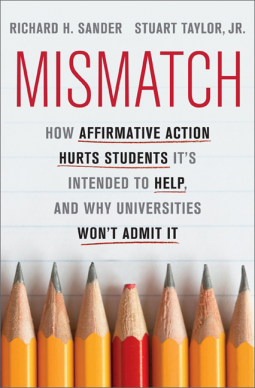
Mismatch
How Affirmative Action Hurts Students It’s Intended to Help, and Why Universities Won’t Admit It
by Richard Sander and Stuart Taylor, Jr.
This title was previously available on NetGalley and is now archived.
Send NetGalley books directly to your Kindle or Kindle app
1
To read on a Kindle or Kindle app, please add kindle@netgalley.com as an approved email address to receive files in your Amazon account. Click here for step-by-step instructions.
2
Also find your Kindle email address within your Amazon account, and enter it here.
Pub Date Oct 09 2012 | Archive Date Nov 30 2012
Perseus Books Group | Basic Books
Description
The debate over affirmative action has raged for over four decades, with little give on either side. Most agree that it began as noble effort to jump-start racial integration; many believe it devolved into a patently unfair system of quotas and concealment. Now, as the Supreme Court gets ready to hear oral arguments on Fisher v. Texas, a case that could sharply curtail the use of racial preferences in American universities, on October 10, law professor Richard Sander and legal journalist Stuart Taylor offer a definitive account of what affirmative action has become in MISMATCH: How Affirmative Action Hurts Students It's Intended to Help, and Why Universities Won't Admit It (Basic Books; October 9, 2012), showing that while the objective is laudable, the effects have been anything but.
Sander and Taylor have long admired affirmative action's original goals, but after many years of studying racial preferences, they have reached a controversial but undeniable conclusion: preferences hurt underrepresented minorities far more than they help them. At the heart of affirmative action's failure is a simple phenomenon called mismatch. Using dramatic new data and numerous interviews with affected former students and university officials of color, the authors show how racial preferences often put students in competition with far better-prepared classmates, dooming many to fall so far behind that they can never catch up. Mismatch largely explains why, even though black applicants are more likely to enter college than whites with similar backgrounds, they are far less likely to finish; why there are so few black and Hispanic professionals with science and engineering degrees and doctorates; why black law graduates fail bar exams at four times the rate of whites; and why universities accept relatively affluent minorities over working class and poor people of all races.
Sander and Taylor believe it is possible to achieve the goal of racial equality in higher education, but they argue that alternative policies-such as full public disclosure of all preferential admission policies, a focused commitment to improving socioeconomic diversity on campuses, outreach to minority communities, and a renewed focus on K-12 schooling-will go farther in achieving that goal than preferences, while also allowing applicants to make informed decisions. Bold, controversial, and deeply researched, MISMATCH calls for a renewed examination of this most divisive of social programs-and for reforms that will help realize the ultimate goal of racial equality.
Richard H. Sander, a law professor and economist at UCLA who worked as a community organizer and civil rights activist on Chicago's South Side, is a well-known scholar on race and higher education. He lives in Los Angeles. Stuart Taylor, Jr., a former New York Times Supreme Court reporter and co-author of the critically acclaimed Until Proven Innocent, is a National Journal contributor and Brookings fellow. He has long been one of the nation's leading legal journalists. He lives in Washington, D.C.
Advance Praise
“This lucid, data-rich book is simply the best researched and most convincing analysis ever done of affirmative action in higher education, a work at once impeccably scholarly and entirely accessible to anyone interested in the social and legal ramifications of well-intentioned policies that, as the authors show, have a boomerang effect on the intended beneficiaries.”
—Judge Richard A. Posner
“As a high-profile defender of affirmative action, I used to think the so-called ‘mismatch’ problem was a bit overblown. Richard Sander and Stuart Taylor have caused me to think again. How many bright and promising minority students, we must ask, have failed because they were steered—with the best intentions, of course—into elite schools for which they were less prepared academically than most of their classmates? What better ways can we devise to boost academic achievement and expand the pool of qualified students of all races? We don't do future generations of students any favors by trying to ignore this issue or pretend it doesn't exist. If common-sense moderates don't step up and engage this debate, we only allow extremists to take control of it.”
—Clarence Page, Pulitzer Prize-winning (1989 for Commentary) syndicated columnist for the Chicago Tribune
“This book probably will make constitutional history. Written at the intersection of social science and law, its data conclusively demonstrate the damage that has been done to intended beneficiaries by courts’ decisions that have made racial preferences in college admissions an exception to the Constitution’s guarantee of equal protection of the laws.”
—George F. Will
Available Editions
| EDITION | Hardcover |
| ISBN | 9780465029969 |
| PRICE | $28.99 (USD) |
| PAGES | 368 |



